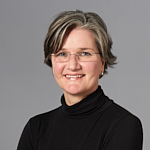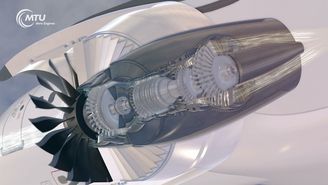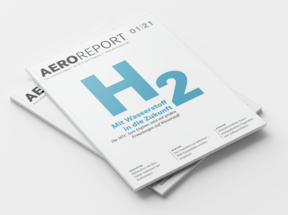
Press archive detail
Last bolt ceremony: MTU Aero Engines completes first turbine center frame for GE9X
Munich, February 2, 2016 – The achievement is no mean feat: MTU Aero Engines in Munich has completed the first development turbine center frame (TCF for short) to go into the GE9X engine. “In this engine program, we are not only responsible for the manufacture of the TCF, but also assumed responsibility for its development right from the outset,” explained Dr. Jörg Henne, Senior Vice President Engineering and Technology, on the occasion of the last bolt ceremony held in Munich in late January. “On another positive note, to make the deadline, we have completed the first GE9X TCF within record time,” according to Theodor Pregler, Senior Vice Presi-dent Commercial Programs at MTU in Munich.
The new GE engine has been selected to be the exclusive propulsion system for the Boeing 777X. Delivering more than 100,000 pounds of thrust, the GE9X will be the most fuel-efficient engine ever produced by GE Aviation on a per-pounds-of-thrust basis. The schedule is as follows: The first run of the engine is slated for this spring, and entry into service is expected for 2020. To date, firm orders have been received over 300 of the aircraft.
Said Pregler: “We have a stake of four percent in the GE9X program. This secures MTU a significant market share in one of the most important next-generation engines in the upper thrust category.” Long-haul commercial transports are considered a rapidly growing segment of the airliner market that is only moderately exposed to economic fluctuations. Taken over the entire life of the GE9X, MTU expects the program to generate revenues in the amount of some four billion euros. The TCF for the GE9X is the most highly sophisticated turbine center frame in MTU’s port-folio from a technology point of view. “Starting from the basic architecture of the TCF for the GEnx, we’ve made some comprehensive optimizations,” reported Henne. These improvements include enhanced constructions and a new suspension concept for the first LPT vane.
A sophisticated engine component
The turbine center frame is the duct for the hot gas flowing from the high-pressure turbine into the low-pressure turbine. The structural component is essentially made up of two groups of parts: the hub strut case (HSC) and the flowpath hardware (FPH). The HSC is the main structural element and consists of a casing containing a number of support struts assembled around a hub with an integrated bearing chamber. The FPH is made up of castings that form the gas-flow duct. “The TCF is a highly engineered engine component serving a multitude of functions and is manufactured to tight tolerances,” explained Henne. Pregler added: “Thanks to our many years of ex-perience in the field of TCFs, we’ve succeeded in further expanding our close and trustful partnership with GE.”
Germany’s leading engine manufacturer began to produce turbine center frames when it took a stake in the GP7000 engine powering the A380. Next in line was the TCF for the GEnx, the engine that powers the Boeing 787 Dreamliner and the Boeing 747-8 long-range widebody airliner. MTU took on responsibility for the development and production of the GE9X module in July 2014.
About MTU Aero Engines
MTU Aero Engines AG is Germany's leading engine manufacturer. The company is a technological leader in low-pressure turbines, high-pressure compressors, turbine center frames as well as manufacturing processes and repair techniques. In the commercial OEM business, the company plays a key role in the development, manufacturing and marketing of high-tech components together with international partners. Some 30 percent of today’s active aircraft in service worldwide have MTU components on board. In the commercial maintenance sector the company ranks among the top 5 service providers for commercial aircraft engines and industrial gas turbines. The activities are combined under the roof of MTU Maintenance. In the military arena, MTU Aero Engines is Germany's industrial lead company for practically all engines operated by the country's military. MTU operates a network of locations around the globe; Munich is home to its corporate headquarters. In fiscal 2014, the company had a workforce of some 9,000 employees and posted consolidated sales of approximately 3.9 billion euros.
Contact

Press Officer Technology



